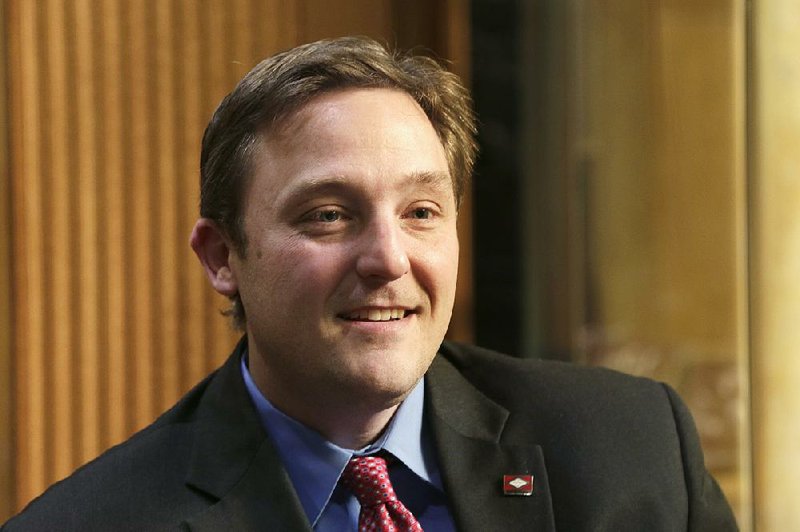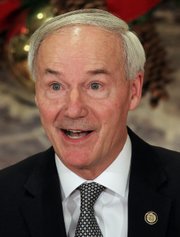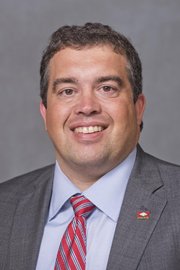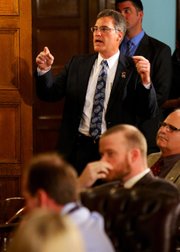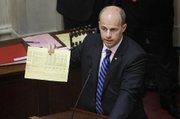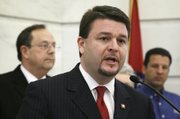Arkansas' 91st General Assembly will grapple with how deeply to cut taxes, how much to change a constitutional amendment that allows the medical use of marijuana and whether to enact further restrictions on abortion. The Legislature's regular session starts Monday.
Also, the Republican-controlled Legislature will enact a general revenue budget for the next fiscal year, deciding how much money to give public schools, human services and other programs; and will consider whether to reauthorize the use of federal and state funds to provide health insurance for more than 300,000 low-income Arkansans.
Legislators also will decide whether college faculty and staff members, with the proper permits, should be allowed to carry concealed weapons on campus, how to expand broadband Internet access in Arkansas and what proposed constitutional amendments to refer to voters in the 2018 general election.
The House of Representatives will have 76 Republicans and 24 Democrats, and the Senate will have 26 Republicans and nine Democrats. Republicans increased their ranks in the House and Senate in the Nov. 8 general election, after which three House Democrats changed parties.
"My counsel is to take advantage of this opportunity, be bold, and I think we need to respect the differences between ourselves," said Gov. Asa Hutchinson, who is the titular head of the state GOP. "We are a broad party, and there are a lot of different ideas and so let's have a debate. But in the end, we've got to get something accomplished, and we have got to come together."
House Democratic leader Michael John Gray of Augusta said he's "apprehensive" heading into the session in the aftermath of the November election.
"I am not going to gloss it over," he said. "The campaign season is still fresh for a lot of people.
"We are hoping that once we get past that a little bit ... that we will be able to set political ideology aside a little bit and get down to doing things that we were sent here to do and represent our districts more so than parties," Gray said.
During the regular session in 2015, lawmakers met for 82 days after House Speaker Jeremy Gillam, R-Judsonia, said he was aiming for an 85-day session. The regular session in 2011 lasted 96 days, and the 2013 regular session was 101 days long.
"There is not a marker this time," Gillam said.
That's due in part to having a new U.S. president -- Republican real estate mogul Donald Trump takes office Jan. 20 -- plus Republicans controlling the U.S. House and Senate, "and new changes that might come about on health care and a few other issues," Gillam said.
"That will dictate us to be patient and not have any kind of arbitrary deadlines on when we are getting out of here," the speaker said. The potential of legislative changes to Amendment 98 -- the Arkansas Medical Marijuana Amendment -- also "throws a little bit of a new variable into the equation for us," Gillam said.
Senate President Pro Tempore Jonathan Dismang, R-Searcy, said, "All that I will commit to is, we are going to work efficiently, we are going to do the people's business and we are going to be diligent in the work."
TAX CUTS
Hutchinson is proposing a cut in individual income tax rates for Arkansans who have taxable incomes below $21,000. State officials have projected that such a cut, starting in mid-fiscal 2019, would reduce general revenue by $25 million that year and an annual $50 million thereafter.
In 2015, the Legislature approved Hutchinson's legislation to cut taxes on incomes of between $21,000 and $75,000 a year. That cut was projected to reduce general revenue by $100 million in fiscal 2017, which started June 30.
Hutchinson also proposes that recipients of military retirement benefits be exempted from paying state income taxes. Doing that would reduce the state general fund by $13 million a year.
It's part of a larger $19 million-a-year plan to reduce some taxes and increase others. The larger plan would reduce the tax on soft-drink syrup but raise the sales tax rate on candy and soft drinks. It would apply the sales tax on the full cost of "manufactured housing" and require unemployment-benefits recipients to pay income taxes on that compensation.
"I support in theory what we are trying to do, but I want to make sure this gets us to the goal of having one tax table again, said Dismang, who serves on the Senate Revenue and Taxation Committee. "What I would like for us to do is to begin work on the tax cuts and get a consensus on that relatively early in the session because of the impact that will have on the rest of the budget.
"We still need to continue adding to a true long-term reserve fund, so we have some cushion for potential future ups and down on state revenues."
Net general revenue available to state agencies fell about $8 million short of forecasts during the first six months of the current fiscal year, mostly because of lagging sales-and-use tax collections. That's left some lawmakers leery of committing to Hutchinson's $50 million a year income tax cut.
"I haven't gotten to a point yet where I am making any kind of definitive decisions. I am still looking at the numbers and the budget," Gillam said. "I think that there is probably going to be some room to do something with the income tax cut."
Other lawmakers want the Legislature to be bolder and cut individual income taxes by more than $50 million a year. Some are tossing around a variety of ways to also help cut the taxes on incomes above $75,000 a year.
Rep. Charlie Collins, R-Fayetteville, said he favors repealing a 2013 law that will cut the sales tax on groceries from the current 1.5 percent to 0.125 percent.The cut was approved in anticipation of the state saving $65 million a year when it stops making desegregation payments to Pulaski County school districts after fiscal 2018. Collins wants to instead cut the taxes on incomes that top $75,000 a year. Hutchinson wants to cut taxes on $75,000-plus incomes down the road.
It's projected that the grocery sales tax rate cut will go into effect in January or April of 2019, said Jake Bleed, a spokesman for the state Department of Finance and Administration.
Senate Revenue and Taxation Committee chairman Jake Files, R-Fort Smith, said, "My initial reaction is that I think this may be difficult to convince a large majority of legislators to reverse course and move a different way."
Hutchinson said he doesn't consider redirecting funds that would reduce the grocery sales tax "a viable option" as a way to fund more income tax cuts.
"Substantively, it is a fair debate, but it would be perceived as a tax increase because a decrease was planned," he said. "It has been a commitment that the General Assembly has made in the past and made into law, and I don't think you would be able to arrive at a majority to change directions."
STATE BUDGET
Hutchinson has proposed a general revenue budget of $5.48 billion for fiscal 2018, a $153 million increase in which most of the additional money would go to the state Department of Human Services.
The Department of Human Services budget would increase by $112.8 million, to a total of $1.55 billion. That includes a $75.5 million increase in the department's grant budget, which includes the Medicaid program, to a total of $1.14 billion; and a $26.7 million increase in the Children and Family Services Division budget, to $118.2 million.
The state plans to pay its $100 million share of Arkansas' Medicaid expansion in fiscal 2018 using about $75 million in general revenue and $25 million from insurance premium taxes, state budget administrator Duncan Baird has said. The state starts paying 5 percent of the Medicaid expansion cost this year. The cost will gradually increase to 10 percent by 2020.
Hutchinson wants to use $90 million of a projected state surplus of $229.4 million as one-time funding for the Medicaid program, and $100 million of the projected surplus for the state's share of public school facility funding. Hutchinson proposed keeping the budget for two- and four-year colleges flat at $733 million in fiscal 2018, but he's pledged to propose a $10 million increase in fiscal 2019 if the Legislature changes the funding formula for institutions to focus more on graduations rather than enrollments.
MEDICAID
The state's version of Medicaid expansion -- now called Arkansas Works -- has divided Republicans ever since the Republican-controlled Legislature and then-Gov. Mike Beebe, a Democrat, authorized it in 2013. The Medicaid expansion provides health insurance for more than 300,000 low-income Arkansans.
Authorizing the use of state and federal money for the program requires 75 votes in the House and 27 votes in the Senate, and those have been difficult thresholds to reach every year since 2013.
"I can't imagine why we would re-litigate Arkansas Works or the private option at this point because there is not any clarity [on] what is going to happen at the federal level," said Dismang, who is one of the three leading legislative architects of the Medicaid expansion.
The funding for the private option is authorized under the U.S. Patient Protection and Affordable Care Act.
Is Congress "going to repeal and replace" the Affordable Care Act, "and what is that replacement going to look like? So I think we would be spinning our wheels to try to come up with some fix or alterations," Dismang said.
Hutchinson said he hopes the Trump administration allows Arkansas more flexibility to make changes to the private-option program.
But Sen. Bryan King, R-Green Forest, said he plans to introduce legislation to end the private option.
MEDICAL MARIJUANA
Lawmakers plan to consider changing the Arkansas Medical Marijuana Amendment, which voters approved in November and many lawmakers opposed.
The new Medical Marijuana Commission is developing rules for cultivation and dispensary licenses. Rep. Douglas House, R-North Little Rock, and Sen. Greg Standridge, R-Russellville, have begun organizing medical marijuana legislation.
"We are going to have to decide legislatively how much do we want to set in stone through legislation and how much do we want to allow the rules and regulation process to work," said Dismang. He said he prefers giving latitude to agencies to allow them to fix problems that arise "rather than creating legislation that is a stumbling block to controlling the program."
CONCEALED WEAPONS
Collins said he's drafting legislation regarding concealed carry of weapons on campus.
Allowing faculty and staff employees to carry concealed weapons will have a "deterrent effect" on "the crazy killers" and help keep "our loved ones safe," he said. He's not yet talked with Hutchinson about the legislation, he said.
Under Collins' legislation approved in 2013, college and university trustees have the power to decide whether to allow concealed weapons on campus. All state public higher-education institutions have passed policies that prohibit guns on their campuses and have renewed the policies yearly since then.
Hutchinson said parents want to send their children to safe and secure campuses.
"Is that best accomplished by staff being armed or is that best accomplished by having gun-free zones? There are differences of opinion on that. My inclinations are to defer to the local leaders for those decisions," the governor said.
Collins said he's optimistic about the chances of his legislation passing.
ABORTION
Rep.-elect Andy Mayberry, R-East End, who crafted the state's ban on abortions after 20 weeks, has filed a bill to restrict a method used to terminate the pregnancies of women in their second trimesters.
The legislation to ban abortion by dilation and evacuation would make it illegal for doctors to use surgical instruments to "dismember" a fetus within the woman's body. Abortion-rights advocates say Mayberry's bill will restrict the most commonly used procedure for women in their second trimesters.
The federal government banned most third-trimester abortions, or partial-birth abortions, in 2003.
BROADBAND
Gillam said he is working with several representatives on an initiative to expand broadband in the state and plans to consult lawmakers regarding a few options to accomplish that. He declined to provide details.
"The goal of the initiative is finding a path forward to where Arkansans will have all their homes and their businesses and their schools with a high rate of connectivity in a totality for the state instead of just focus on schools," he said.
"I think where we will end up probably will not involve the state in any kind of taxpayer dollars as a whole."
CONSTITUTIONAL AMENDMENTS
Lawmakers are expected to consider proposed amendments to overhaul tort laws, increase highway funding, repeal the fiscal legislative sessions that are held in even-numbered years, and allow state Supreme Court justices to be appointed. The Legislature can refer up to three amendments to voters. The 1874 Arkansas Constitution now has 98 amendments.
CLINTON AIRPORT
Sen. Jason Rapert, R-Bigelow, said he's considering introducing legislation to change the name of the Bill and Hillary Clinton National Airport/Adams Field, back to Adams Field.
In 2012, the Little Rock Municipal Airport Commission unanimously renamed the state's largest airport after the Clintons, who are both Democrats. Bill Clinton is a former U.S. president and former Arkansas governor. Hillary Clinton is a former U.S. secretary of state, former presidential candidate, and former U.S. and Arkansas first lady. Previously, the airport had been known since 1995 as Little Rock National Airport, Adams Field.
Rapert said he believes the name change was aimed at helping Hillary Clinton's presidential campaign and that having the couple's name on the airport has had a "negative effect" on the state.
"The airport commission is part of the city of Little Rock," Dismang said. "That's under their jurisdiction, and the naming rights is part of what they do and not something that we should be directing on the legislative level."
Gillam said: "I haven't heard any of our House members discussing anything extraneous to that point of whose name is on an airport. ... They are talking about jobs. They are talking about health care."
"I think we have got some very important business, and I don't think the state needs to engage in the naming of local institutions," the governor said.
Information for this article was contributed by Brian Fanney and John Moritz of the Arkansas Democrat-Gazette.
SundayMonday on 01/08/2017

